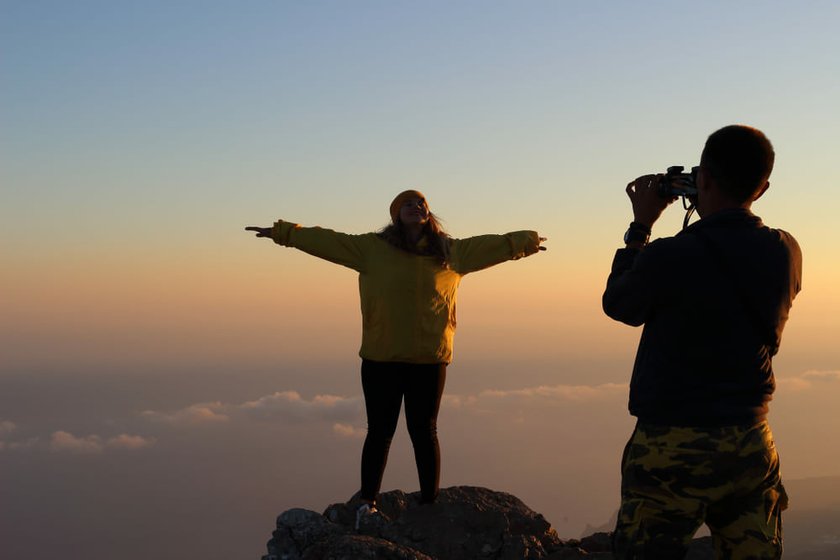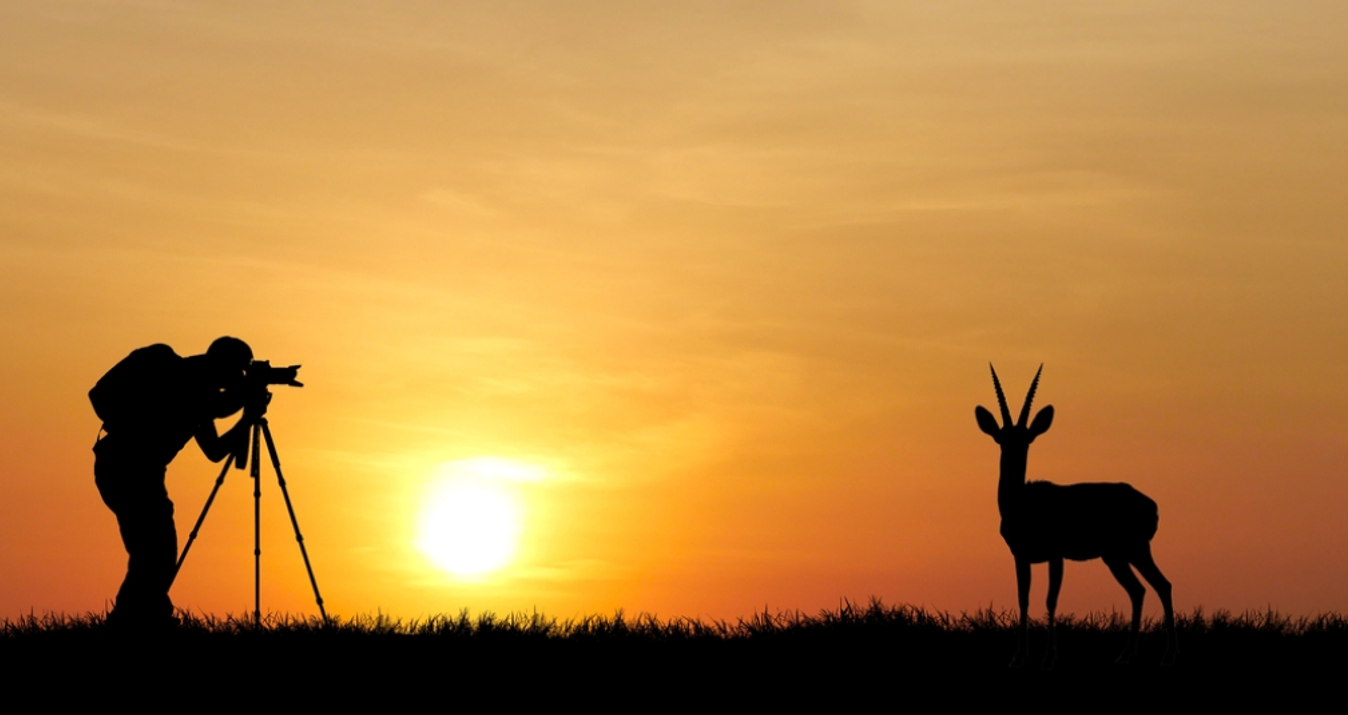Sunset Portrait Photography - Essential Techniques & Tips
July 01, 2024

Want to capture stunning sunset portraits? This guide will show you how! Read it to learn easy techniques to help them capture beautiful and memorable photos during the golden hour!
Are you interested in learning how to take portraits at sunset? Today, we will provide practical tips on everything from choosing the best day to setting your camera correctly!
Just grab your camera, and let's dive in!
Advanced yet easy-to-use photo editor
Get Luminar Neo NowWhy Sunsets Look Amazing
 The atmosphere during sunsets changes sunlight! When the sun is low in the sky, its light travels through more air. This filters out the blue and violet colors, leaving reds, oranges, and yellows!
The atmosphere during sunsets changes sunlight! When the sun is low in the sky, its light travels through more air. This filters out the blue and violet colors, leaving reds, oranges, and yellows!
The atmosphere acts like a prism, spreading out the light. Dust and water droplets can make the colors even more vibrant. So, the beautiful colors you see in sunsets are thanks to the atmosphere filtering the light!
Different conditions in the air can make some sunsets look more colorful than others. That's why some sunset photos are stunning, while others might look a bit plain.
Best Weather for Shooting Portraits at Sunset
 Pay attention to the weather when shooting portraits at sunset to get the best colors and clear images. Here are some ideal conditions!
Pay attention to the weather when shooting portraits at sunset to get the best colors and clear images. Here are some ideal conditions!
Partly Cloudy Skies
A few clouds can make your photos better by reflecting light and creating beautiful colors. They also add depth to your photos.
After a Storm
Right after a rainstorm, the air is cleaner, which means more vibrant colors and clearer images. If you see storm clouds clearing, grab your camera for a stunning sunset!
Hazy Days
Haze can make sunset colors more beautiful! The tiny particles in the air scatter the light, creating a soft, glowing effect. However, haze can also make images less sharp, so you might need to adjust your photos afterward!
High Altitude
If you go to a higher altitude, like on a hill or mountain, it can make sunsets more vivid. The thinner atmosphere results in brighter colors and sharper images!
Camera Settings For Sunset: Ready Settings List
Learn moreWhat You Need
 If you know the right settings and gear to use, capturing beautiful sunset portraits can be easy and fun!
If you know the right settings and gear to use, capturing beautiful sunset portraits can be easy and fun!
Camera Settings for Sunset Portraits
ISO: This setting controls how sensitive your camera is to light. Keep it low (around 100-200) to ensure clear and grainy photos. If it’s getting dark, you can raise the ISO, but be careful not to make the picture too noisy.
Aperture: This affects how much light gets into your camera and what’s in focus. Use a setting of f/11 or f/16. This helps keep both your subject and the beautiful sunset background sharp.
Shutter Speed: A fast shutter speed (like 1/250) freezes motion, while a slower speed (like 1/30) lets in more light.
White Balance: To get warm sunset colors, set your camera to “Shade” or “Cloudy.” If you want cooler tones, try “Daylight” or “Tungsten.”
Essential Gear
Wide-Angle Lens: A lens that ranges from 12-18mm is great for capturing wide views of the sunset.
Telephoto Lens: A lens that ranges from 100-400mm is great for zooming in on details.
Filters:
Circular Polarizer (CPL): This filter reduces glare and makes colors pop.
Neutral Density (ND) Filter: This filter helps manage bright light so your photos aren’t overexposed.
Graduated ND Filter: This is useful for balancing the light between the bright sky and the darker ground.
Tripod: A sturdy tripod is a must to keep your camera steady! Using a remote shutter release or your camera’s self-timer can help you take sharp photos without any camera shake.
Exclusive Tools of Endless Possibilities in One AI Editor
EXPLORE NOW!Shooting Tips
 Beautiful sunset portraits are easier with the right timing, location, and composition. Here’s how!
Beautiful sunset portraits are easier with the right timing, location, and composition. Here’s how!
Timing
The best time to take sunset photos is about 30 minutes before the sunset, called the golden hour. The light is soft and warm, making your photos look magical. You can check the sunset time in your location by searching on Google!
Location
Choosing the right spot is key for great sunset photos:
High Places: Go to higher spots like hills or viewpoints. These give you a better view of the sunset.
Scenic Spots: Look for places with interesting features like water, mountains, or cityscapes. These add depth and make your photos more interesting.
Check It Out Early: Visit your chosen spot during the day to see where the sun will be and pick the best place to stand.
Composition
Good composition makes your sunset photos stand out. Here are some tips:
Foreground Elements: Include something in the foreground, like a tree, rock, or pier. This adds depth and makes your photo more interesting. Make sure it doesn’t distract from the sunset.
Different Angles: Try shooting from different angles. A low angle can make the sunset look dramatic, while a high angle can show more of the scene. Experiment to see what looks best.
Leading Lines: Use lines that lead the viewer’s eye into the photo, like a path or pier. These lines guide the viewer’s gaze towards the sunset and make the photo more engaging.
Rule of Thirds: Imagine your photo divided into nine equal parts with two horizontal and two vertical lines. Place important elements, like the horizon or the sun, along these lines or where they intersect. This makes the photo more balanced and interesting.
Sunset Photography: The Ultimate Guide
Learn more
Extra Tips
 1. Make Your Subject Comfortable
1. Make Your Subject Comfortable
A relaxed subject leads to better photos. Chat with them before and during the shoot to help them feel at ease. Ask about their day, interests, or favorite movies. This makes the session more enjoyable and results in natural, authentic photos!
2. Use Wide Apertures for Beautiful Backgrounds
To create a soft, blurred background (bokeh), use a wide aperture like f/2.8 or wider (f/1.8 or f/1.4). This makes your subject stand out and adds depth to your photos, especially during sunset. Focus on the eyes to keep them sharp!
3. Adapt to Changing Light
The light changes quickly at sunset. Start with shaded shots when the light is harsh. As the sun lowers, move to areas with filtered light. Capture golden-hour magic with side or front lighting, and finish with backlit silhouettes. Stay a bit longer for stunning blue hour shots.
4. Embrace Lens Flare
Lens flare can enhance your sunset portraits. Position your subject with the sun behind them and let the sun peek out from behind their head or shoulder. Experiment with test shots to get the perfect amount of flare!
5. Capture Silhouette Shots
Silhouette portraits at sunset are timeless. Position your subject with the low sun behind them. Block the sun with their body or another object for a soft glow. Expose the sky to achieve a dark, shadowy figure against a bright background. Keep the silhouette clear of distractions for the best effect.
Editing Your Photos After
After capturing those magical sunset shots, you'll want to perfect them with some editing. And what editing could be better than editing with AI? Luminar Neo is a popular AI photo editor that makes this super easy!
With Luminar Neo, you can apply the golden hour effect to your photos, making the light appear warm and soft, just like during the actual golden hour. It also offers twilight photo editing to enhance your blue-hour shots or create a twilight effect in any outdoor photo!
Additionally, our new project, "Barcelona," is coming out soon. This portrait photo editor has AI-powered effects to enhance facial features and smooth skin and create realistic bokeh. It also includes presets and batch processing to save you time! Be the first to try it!
Advanced yet easy-to-use photo editor
Get Luminar Neo NowConclusion
 Taking great sunset portraits is all about timing, location, and using the right settings. We covered how to pick the best weather, set your camera, find the perfect spot, and compose your shots!
Taking great sunset portraits is all about timing, location, and using the right settings. We covered how to pick the best weather, set your camera, find the perfect spot, and compose your shots!
We also talked about using Luminar Neo to edit your photos and make them look even better. With these tips, you'll be ready to capture amazing sunset portraits. Enjoy your photography and happy shooting!

 1. Make Your Subject Comfortable
1. Make Your Subject Comfortable



